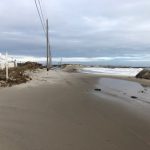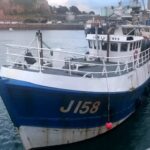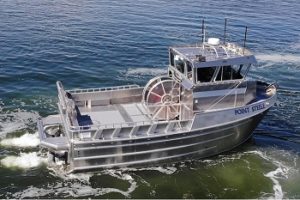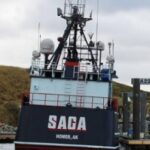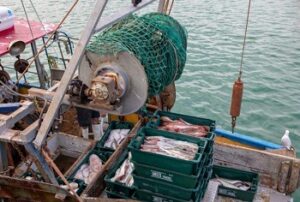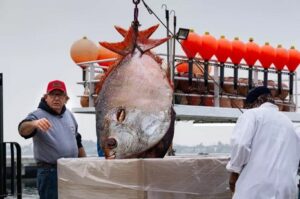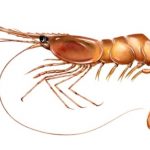Tag Archives: Department of Fisheries and Oceans (DFO)
Want some of your cod back? European Union requests exchange of its northern cod for a chunk of redfish quota
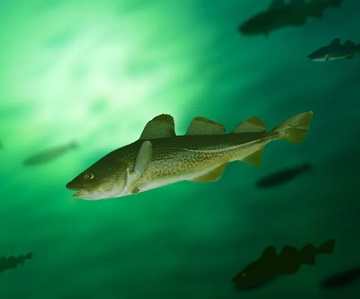 The European Union wants to give back some of its offshore northern cod quota in exchange for some of Canada’s offshore redfish quota. According to Fisheries, Forestry and Agriculture Minister Gerry Byrne, the EU has indicated it is willing to give back 70 tonnes of northern cod and wants 245 tonnes of red fish in return. According to fisheries management information published by the Northwest Atlantic Fisheries Organization (NAFO), the European Union has a total allowable catch of 735 tonnes of northern cod in NAFO Zone 3L — off eastern Newfoundland — for the 2024-2025 season, which runs until June 30. The EU was allocated nearly 1,094 tonnes of redfish for the same zone for the current season. more, >>CLICK TO READ<< 16:14
The European Union wants to give back some of its offshore northern cod quota in exchange for some of Canada’s offshore redfish quota. According to Fisheries, Forestry and Agriculture Minister Gerry Byrne, the EU has indicated it is willing to give back 70 tonnes of northern cod and wants 245 tonnes of red fish in return. According to fisheries management information published by the Northwest Atlantic Fisheries Organization (NAFO), the European Union has a total allowable catch of 735 tonnes of northern cod in NAFO Zone 3L — off eastern Newfoundland — for the 2024-2025 season, which runs until June 30. The EU was allocated nearly 1,094 tonnes of redfish for the same zone for the current season. more, >>CLICK TO READ<< 16:14
DFO drops investigations into alleged controlling agreements; inshore fisheries advocate calls for independent inquiry to find out why
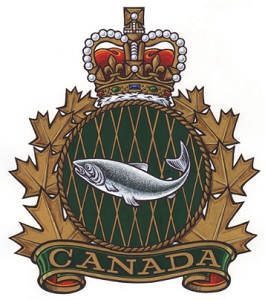 The federal Department of Fisheries and Oceans (DFO) has shut down three separate investigations in this province into alleged illegal controlling agreements that give processing companies control over inshore boats and quotas — including one case that included a harvester’s confession— with no charges laid. DFO officials have yet to say why the cases were closed last week, and whether controlling agreements remain illegal as a means to prevent the corporate takeover of inshore fisheries in Atlantic Canada and Quebec. DFO officials have yet to say why the cases were closed last week, and whether controlling agreements remain illegal as a means to prevent the corporate takeover of inshore fisheries in Atlantic Canada and Quebec. In a July 4th letter to Foss, Paul Didham with DFO’s Conservation and Protection division confirmed the department has decided “not to proceed in this matter.” “Therefore, please be advised that this investigation is now concluded, and no charges pursued.” more, >>CLICK TO READ<< 19:11
The federal Department of Fisheries and Oceans (DFO) has shut down three separate investigations in this province into alleged illegal controlling agreements that give processing companies control over inshore boats and quotas — including one case that included a harvester’s confession— with no charges laid. DFO officials have yet to say why the cases were closed last week, and whether controlling agreements remain illegal as a means to prevent the corporate takeover of inshore fisheries in Atlantic Canada and Quebec. DFO officials have yet to say why the cases were closed last week, and whether controlling agreements remain illegal as a means to prevent the corporate takeover of inshore fisheries in Atlantic Canada and Quebec. In a July 4th letter to Foss, Paul Didham with DFO’s Conservation and Protection division confirmed the department has decided “not to proceed in this matter.” “Therefore, please be advised that this investigation is now concluded, and no charges pursued.” more, >>CLICK TO READ<< 19:11
Shark researchers question DFO policy on catch-and-kill derbies
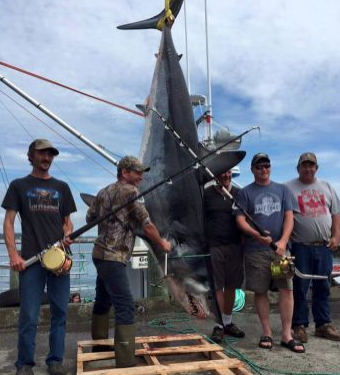 The catching of a large female mako shark has prompted some researchers to question the Fisheries and Oceans Canada policy on Nova Scotia’s annual shark derbies. The shark derbies are annual community festivals that include a shark-fishing event. Fishermen compete to catch large sharks, which are then turned over to the Department of Fisheries and Oceans so scientists can gather biological data. Sharks smaller than 2.4 metres are tagged and released. Brendal Townsend, a shark researcher at Dalhousie University, says she is concerned that the data collected is no longer scientifically useful. She believes the same information could be gathered through catch-and-release methods. Read the rest here 10:13
The catching of a large female mako shark has prompted some researchers to question the Fisheries and Oceans Canada policy on Nova Scotia’s annual shark derbies. The shark derbies are annual community festivals that include a shark-fishing event. Fishermen compete to catch large sharks, which are then turned over to the Department of Fisheries and Oceans so scientists can gather biological data. Sharks smaller than 2.4 metres are tagged and released. Brendal Townsend, a shark researcher at Dalhousie University, says she is concerned that the data collected is no longer scientifically useful. She believes the same information could be gathered through catch-and-release methods. Read the rest here 10:13
N.S. fishermen happy with Ottawa’s promise to protect independent licenses
 Members of the Maritime Fishermen’s Union are pleased that Fisheries and Oceans Canada will begin enforcing a policy that would prevent a corporate takeover of inshore fishing licences. Graeme Gawn, union president for Local 9 in southwestern Nova Scotia, said the federal department announced in late July a tightening of its policy to preserve independence of the inshore fleet in Atlantic Canada’s fisheries. “In our area is where it’s the biggest issue,” Gawn said Tuesday. “We’re facing companies buying up lobster licences, in particular, under questionable agreements.” Read the rest here 22:57
Members of the Maritime Fishermen’s Union are pleased that Fisheries and Oceans Canada will begin enforcing a policy that would prevent a corporate takeover of inshore fishing licences. Graeme Gawn, union president for Local 9 in southwestern Nova Scotia, said the federal department announced in late July a tightening of its policy to preserve independence of the inshore fleet in Atlantic Canada’s fisheries. “In our area is where it’s the biggest issue,” Gawn said Tuesday. “We’re facing companies buying up lobster licences, in particular, under questionable agreements.” Read the rest here 22:57
Increase in TAC for Arctic surf clam on the Banquereau Bank and Grand Bank

The Fishery – a dangerous place to work

Weekend Focus: Marshall decision still ripples through native fishery
 Gary Denny is a captain. He wouldn’t likely be a fishing captain if Donald Marshall Jr. hadn’t set eel nets in Antigonish County’s Pomquet Harbour in 1993. Marshall, from Membertou First Nation, sold the 463 pounds of eels for $787.10 and was arrested. He was charged with fishing without a licence, setting illegal nets during a closed season and selling eels without a licence. Nova Scotia’s courts upheld those charges, but then the Supreme Court of Canada surprised everyone in 1999 — everyone except the Mi’kmaq. Read the rest here 17:41
Gary Denny is a captain. He wouldn’t likely be a fishing captain if Donald Marshall Jr. hadn’t set eel nets in Antigonish County’s Pomquet Harbour in 1993. Marshall, from Membertou First Nation, sold the 463 pounds of eels for $787.10 and was arrested. He was charged with fishing without a licence, setting illegal nets during a closed season and selling eels without a licence. Nova Scotia’s courts upheld those charges, but then the Supreme Court of Canada surprised everyone in 1999 — everyone except the Mi’kmaq. Read the rest here 17:41
Lobster trap seizure sparks dispute with Passamaquoddy Tribe
 A dispute over tribal fishing rights in the Canadian waters of Passamaquoddy Bay has surfaced, following the recent seizure by the Canadian government of lobster traps being fished by members of the . The issue highlights tribal members’ lack of rights in Canada, since the tribe is not recognized by the federal government. Kani Malsom, a Passamaquoddy fisherman from Sipayik, says about 175 of his traps were seized this fall. “It’s our inherent right to fish on that side of the border. We never had to have a license,” Read the rest here 15:21
A dispute over tribal fishing rights in the Canadian waters of Passamaquoddy Bay has surfaced, following the recent seizure by the Canadian government of lobster traps being fished by members of the . The issue highlights tribal members’ lack of rights in Canada, since the tribe is not recognized by the federal government. Kani Malsom, a Passamaquoddy fisherman from Sipayik, says about 175 of his traps were seized this fall. “It’s our inherent right to fish on that side of the border. We never had to have a license,” Read the rest here 15:21
Newfoundland: Shrinking shrimp resource hitting home – Industry bracing for quota cuts again in 2015 –
 It takes sweat and tears, in addition to these shellfish, to keep the boat in the water, steam it as much as 20 hours from Port aux Choix to the fishing grounds, set a trawl and pull the sloppy masses aboard, year after year. The 65-foot vessel is owned by Dwight Spence. Its crew includes his son, Ashley Spence, who has been fishing for more than 20 years, family friend Wade Rumbolt and Chad Spence — now a poster boy for the Canadian Council of Professional Fish Harvesters — who has fished on and off for 15 years with his father and brother. Read the rest here Video here 10:42
It takes sweat and tears, in addition to these shellfish, to keep the boat in the water, steam it as much as 20 hours from Port aux Choix to the fishing grounds, set a trawl and pull the sloppy masses aboard, year after year. The 65-foot vessel is owned by Dwight Spence. Its crew includes his son, Ashley Spence, who has been fishing for more than 20 years, family friend Wade Rumbolt and Chad Spence — now a poster boy for the Canadian Council of Professional Fish Harvesters — who has fished on and off for 15 years with his father and brother. Read the rest here Video here 10:42
Fishermen hold protest in St. Anthony
 During a peaceful protest, the group was able to halt crews from working on the docked factory freezer Ocean Prawns. Similar to a protest held earlier this year in Corner Brook, fishermen are asking the Department of Fisheries and Oceans (DFO) to reconsider the policy, (LIFO) which saw inshore fishermen shoulder 90 per cent of a 10,000-tonne cut in 2014. Read the rest here 10:16
During a peaceful protest, the group was able to halt crews from working on the docked factory freezer Ocean Prawns. Similar to a protest held earlier this year in Corner Brook, fishermen are asking the Department of Fisheries and Oceans (DFO) to reconsider the policy, (LIFO) which saw inshore fishermen shoulder 90 per cent of a 10,000-tonne cut in 2014. Read the rest here 10:16
Rebuilding cod in 3Ps – Stock swimming in right direction – How ’bout that!
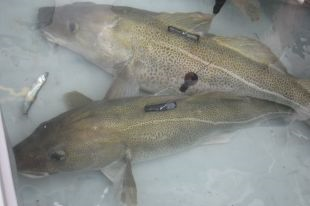 David Coffin, a research management official with the Department of Fisheries and Oceans (DFO) in Newfoundland, said the federal government has initiated a rebuilding plan for the southern Newfoundland Atlantic cod stock in fishing area 3Ps. Read the rest here 21:43
David Coffin, a research management official with the Department of Fisheries and Oceans (DFO) in Newfoundland, said the federal government has initiated a rebuilding plan for the southern Newfoundland Atlantic cod stock in fishing area 3Ps. Read the rest here 21:43
Another hit for the (inshore) Newfoundland shrimp fishery
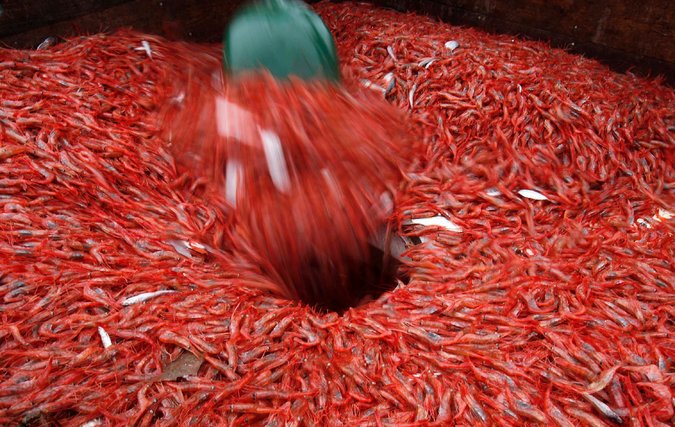 The total allowable catch for shrimp in the NAFO area this year is about 4,300 tonnes, of which Canada has been allocated 3,580 tonnes. With the loss of this quota in 2015, and possible shrimp quota reductions in fishing areas regulated by the Department of Fisheries and Oceans (DFO), an ongoing battle between the inshore and offshore fishery sectors is certain to heat up again. Read the rest here 16:37
The total allowable catch for shrimp in the NAFO area this year is about 4,300 tonnes, of which Canada has been allocated 3,580 tonnes. With the loss of this quota in 2015, and possible shrimp quota reductions in fishing areas regulated by the Department of Fisheries and Oceans (DFO), an ongoing battle between the inshore and offshore fishery sectors is certain to heat up again. Read the rest here 16:37
Fraser River’s sockeye salmon run size uncertain, but ‘great’ – seine boats given a three-day opener
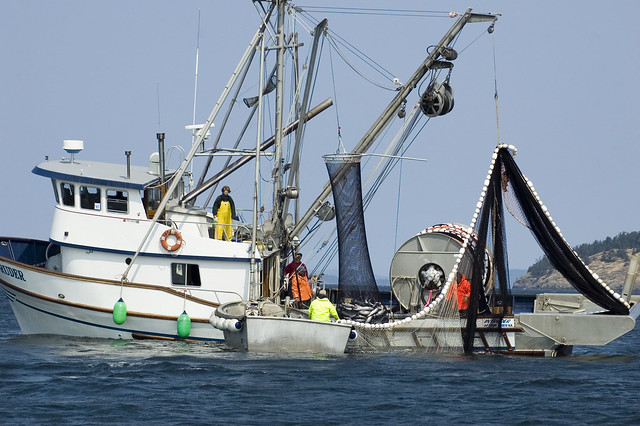 The Fraser River’s sockeye run is being hailed as exceptional by fisheries experts even though there is considerable doubt about how many millions of salmon remain at sea and how many of those fish should be caught. “I would call it a great run,” Jennifer Nener, area director for the Department of Fisheries and Oceans (DFO), said Tuesday as seine boats were given a three-day opening to scoop up late-arriving sockeye off the mouth of the Fraser. Read the rest here 21:08
The Fraser River’s sockeye run is being hailed as exceptional by fisheries experts even though there is considerable doubt about how many millions of salmon remain at sea and how many of those fish should be caught. “I would call it a great run,” Jennifer Nener, area director for the Department of Fisheries and Oceans (DFO), said Tuesday as seine boats were given a three-day opening to scoop up late-arriving sockeye off the mouth of the Fraser. Read the rest here 21:08
A halibut issue impacts south coast fishermen
 “This is absolutely the wrong way to run a fishery,” McCurdy said. “Fish should be allocated to active enterprises, not to wheeler-dealers sitting on the wharf.” He said halibut is a crucial component of a mixed-stock fishery in 3Ps. Without access to halibut, fishing becomes uneconomical. Prior to 2011, fixed gear enterprises in 3Ps could retain halibut up to 10 per cent of their total catch. Read more here 14:45
“This is absolutely the wrong way to run a fishery,” McCurdy said. “Fish should be allocated to active enterprises, not to wheeler-dealers sitting on the wharf.” He said halibut is a crucial component of a mixed-stock fishery in 3Ps. Without access to halibut, fishing becomes uneconomical. Prior to 2011, fixed gear enterprises in 3Ps could retain halibut up to 10 per cent of their total catch. Read more here 14:45
Alexandra Morton Challenges Federal Fish Farm Licences in Court
 Biologist and wild salmon advocate Alexandra Morton headed back to court yesterday to push for stronger government oversight of the transfer of farmed fish into the Pacific Ocean to prevent the spread of a potentially harmful virus. Morton alleges that Marine Harvest transferred farmed salmon infected with piscine reovirus (PRV) to a net pen on the Fraser River sockeye migration route. Read more here 20:34
Biologist and wild salmon advocate Alexandra Morton headed back to court yesterday to push for stronger government oversight of the transfer of farmed fish into the Pacific Ocean to prevent the spread of a potentially harmful virus. Morton alleges that Marine Harvest transferred farmed salmon infected with piscine reovirus (PRV) to a net pen on the Fraser River sockeye migration route. Read more here 20:34
British Columbia Geoduck dispute threatens fisherman safety, harvesters say
 A First Nation’s plan to block all commercial fisheries in their territorial waters in the Strait of Georgia risks the safety of commercial geoduck fishermen, said Michelle James, executive director of Underwater Harvesters Association (UHA), a group of 55 licence holders for geoduck and horse clam fisheries in British Columbia. Read more here 07:54
A First Nation’s plan to block all commercial fisheries in their territorial waters in the Strait of Georgia risks the safety of commercial geoduck fishermen, said Michelle James, executive director of Underwater Harvesters Association (UHA), a group of 55 licence holders for geoduck and horse clam fisheries in British Columbia. Read more here 07:54
McCurdy blasts cuts announced by the Department of Fisheries and Oceans (DFO) to the inshore quota for northern shrimp
 The inshore quota has dropped from 45,300 tonnes in 2013 to 33,876 this year — a decline of 26.2 per cent. By comparison, the offshore sector’s portion of the quota is down only 3.6 per cent compared to 2013 — from 66,224 tonnes to 63,789 in 2014. The FFAW is planning to organize a protest later this week. Read more here the telegram 13:59
The inshore quota has dropped from 45,300 tonnes in 2013 to 33,876 this year — a decline of 26.2 per cent. By comparison, the offshore sector’s portion of the quota is down only 3.6 per cent compared to 2013 — from 66,224 tonnes to 63,789 in 2014. The FFAW is planning to organize a protest later this week. Read more here the telegram 13:59
Committee on the Status of Endangered Wildlife in Canada (COSEWIC): Endangering an industry
 It all began in the fall of 2013 when reports surfaced about the Committee on the Status of Endangered Wildlife in Canada (COSEWIC) making recommendations to the Department of Fisheries and Oceans (DFO) to list Atlantic cod under the Species at Risk Act. Read more here 23:19
It all began in the fall of 2013 when reports surfaced about the Committee on the Status of Endangered Wildlife in Canada (COSEWIC) making recommendations to the Department of Fisheries and Oceans (DFO) to list Atlantic cod under the Species at Risk Act. Read more here 23:19
Marine researcher joins Vancouver Aquarium two years after losing federal funding
![]() A former government scientist whose marine toxicology program was shut down in 2012 has found a new home for his work at the Vancouver Aquarium. Peter Ross, a leading expert on the effects of ocean pollution on killer whales and other marine mammals, found himself out of a job when the Department of Fisheries and Oceans (DFO) cut funding to his Sidney, B.C.-based lab. Read more@globeandmail 09:14
A former government scientist whose marine toxicology program was shut down in 2012 has found a new home for his work at the Vancouver Aquarium. Peter Ross, a leading expert on the effects of ocean pollution on killer whales and other marine mammals, found himself out of a job when the Department of Fisheries and Oceans (DFO) cut funding to his Sidney, B.C.-based lab. Read more@globeandmail 09:14
ITQ’s: Changes to salmon fishery causing concern among Prince Rupert fishermen
![]() Prince Rupert’s United Fishermen and Allied Workers’ Union (UFAWU) representative is concerned with changes the Department of Fisheries and Oceans (DFO) is considering to the BC salmon fishery. The DFO is planning to change the salmon fishery from an open fishery model to individual transferable quotas (ITQ), which Joy Thorkelson said could put the fishery at a conservation risk and could leave fishermen on the North Coast holding the short end of the stick. Read more@thenorthernview 14:24
Prince Rupert’s United Fishermen and Allied Workers’ Union (UFAWU) representative is concerned with changes the Department of Fisheries and Oceans (DFO) is considering to the BC salmon fishery. The DFO is planning to change the salmon fishery from an open fishery model to individual transferable quotas (ITQ), which Joy Thorkelson said could put the fishery at a conservation risk and could leave fishermen on the North Coast holding the short end of the stick. Read more@thenorthernview 14:24
Salmon farmer fishing for higher returns
 As the co-owner of Omega Pacific Hatchery, near Port Alberni, Ms. Schmitt has been growing salmon for the fish-farming industry for 34 years. During that time, she figures the company has spawned more than 10,000 adult Chinook and reared more than 30 million juveniles from eggs. Along the way, she became convinced the best way to grow young Chinook salmon is to mimic nature by raising them in colder water, for longer and feeding them less than the Department of Fisheries and Oceans (DFO) does in its federally run hatcheries. Read more@globeandmail 08:03
As the co-owner of Omega Pacific Hatchery, near Port Alberni, Ms. Schmitt has been growing salmon for the fish-farming industry for 34 years. During that time, she figures the company has spawned more than 10,000 adult Chinook and reared more than 30 million juveniles from eggs. Along the way, she became convinced the best way to grow young Chinook salmon is to mimic nature by raising them in colder water, for longer and feeding them less than the Department of Fisheries and Oceans (DFO) does in its federally run hatcheries. Read more@globeandmail 08:03
Northern cod threatened by new fisheries rules – A Department of Fisheries and Oceans plan to increase northern cod quotas could devastate the species.
 Governments should be informed by the best available data and evidence. There are societal, environmental, and economic ramifications of not doing so. Despite this, some decision-makers appear to attach little value to scientific advice. Changes to the Fisheries Act in 2012 provide one example. Another was very quietly communicated by the Department of Fisheries and Oceans (DFO) late last week. continued@ the star.com
Governments should be informed by the best available data and evidence. There are societal, environmental, and economic ramifications of not doing so. Despite this, some decision-makers appear to attach little value to scientific advice. Changes to the Fisheries Act in 2012 provide one example. Another was very quietly communicated by the Department of Fisheries and Oceans (DFO) late last week. continued@ the star.com


































